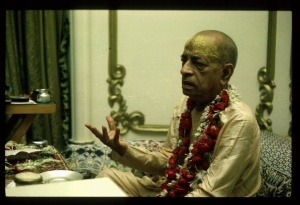SB 6.1.50

A.C. Bhaktivedanta Swami Prabhupada
TEXT 50
- pañcabhiḥ kurute svārthān
- pañca vedātha pañcabhiḥ
- ekas tu ṣoḍaśena trīn
- svayaṁ saptadaśo 'śnute
SYNONYMS
pañcabhiḥ — with the five working senses (voice, arms, legs, anus and genitals); kurute — performs; sva-arthān — his desired interests; pañca — the five objects of the senses (sound, form, touch, aroma and taste); veda — knows; atha — thus; pañcabhiḥ — by the five senses of perception (hearing, seeing, smelling, tasting and feeling); ekaḥ — the one; tu — but; ṣoḍaśena — by these fifteen items and the mind; trīn — the three categories of experience (happiness, distress and a mixture of both); svayam — he, the living entity himself; saptadaśaḥ — the seventeenth item; aśnute — enjoys.
TRANSLATION
Above the five senses of perception, the five working senses and the five objects of the senses is the mind, which is the sixteenth element. Above the mind is the seventeenth element, the soul, the living being himself, who, in cooperation with the other sixteen, enjoys the material world alone. The living being enjoys three kinds of situations, namely happy, distressful and mixed.
PURPORT
Everyone engages in work with his hands, legs and other senses just to achieve a certain goal according to his concocted ideas. One tries to enjoy the five sense objects, namely form, sound, taste, aroma and touch, not knowing the actual goal of life, which is to satisfy the Supreme Lord. Because of disobeying the Supreme Lord, one is put into material conditions, and he then tries to improve his situation in a concocted way, not desiring to follow the instructions of the Supreme Personality of Godhead. Nevertheless, the Supreme Lord is so kind that He comes Himself to instruct the bewildered living entity how to act obediently and then gradually return home, back to Godhead, where he can attain an eternal, peaceful life of bliss and knowledge. The living entity has a body, which is a very complicated combination of the material elements, and with this body he struggles alone, as indicated in this verse by the words ekas tu. For example, if one is struggling in the ocean, he must swim through it alone. Although many other men and aquatics are swimming in the ocean, he must take care of himself because no one else will help him. Therefore this verse indicates that the seventeenth item, the soul, must work alone. Although he tries to create society, friendship and love, no one will be able to help him but Kṛṣṇa, the Supreme Lord. Therefore his only concern should be how to satisfy Kṛṣṇa. That is also what Kṛṣṇa wants (sarva-dharmān parityajya mām ekaṁ śaraṇaṁ vraja (BG 18.66)). People bewildered by material conditions try to be united, but although they strive for unity among men and nations, all their attempts are futile. Everyone must struggle alone for existence with the many elements of nature. Therefore one's only hope, as Kṛṣṇa advises, is to surrender to Him, for He can help one become free from the ocean of nescience. Śrī Caitanya Mahāprabhu therefore prayed:
- ayi nanda-tanuja kiṅkaraṁ
- patitaṁ māṁ viṣame bhavāmbudhau
- kṛpayā tava pāda-paṅkaja-
- sthita-dhūlī-sadṛśaṁ vicintaya
- (CC Antya 20.32, Śikṣāṣṭaka 5)
"O Kṛṣṇa, beloved son of Nanda Mahārāja, I am Your eternal servant, but somehow or other I have fallen into this ocean of nescience, and although I am struggling very hard, there is no way I can save myself. If You kindly pick me up and fix me as one of the particles of dust at Your lotus feet, that will save me."
In a similar way, Bhaktivinoda Ṭhākura sang:
- anādi karama-phale, paḍi' bhavārṇava-jale,
- taribāre nā dekhi upāya
"My dear Lord, I cannot remember when I somehow or other fell into this ocean of nescience, and now I can find no way to rescue myself." We should remember that everyone is responsible for his own life. If an individual becomes a pure devotee of Kṛṣṇa, he is then delivered from the ocean of nescience.